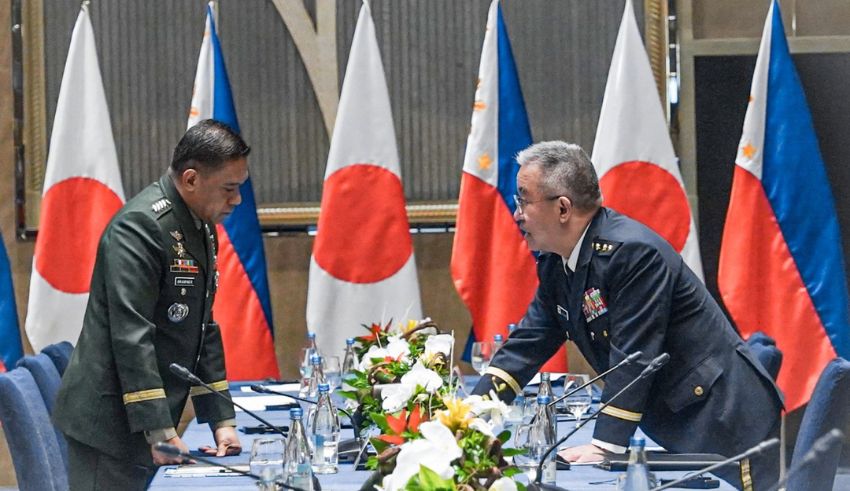
A heated discussion has been started by Japan’s recent policy change permitting it to provide military help to the Philippines. While some view this choice as a necessary step to improve regional defense capacity, others are concerned about possible escalation and domestic issues. Examining the ramifications of this important development exposes a complicated range of advantages and hazards that have to be properly balanced.
Improved Coordination and Security
Particularly in the disputed South China Sea, Japan’s sophisticated military hardware and knowledge may greatly strengthen the marine defense of the Philippines. Long a flashpoint, the region has multiple nations claiming overlapping territory, including China. Improving the defense capacity of the Philippines would discourage aggression and hence protect its territory integrity. This enhanced capacity could prove essential to guarantee that the Philippines can monitor and defend its seas from illegal access.
Respecting Bilateral Ties
More bilateral links are created when Japan and the Philippines cooperate more militarily. Through better communication and interoperability between their armed forces, joint military exercises and training programs can help to coordinate and respond more effectively to regional security challenges. Apart from enhancing the immediate defensive posture, such collaboration fosters long-term resilience and understanding between the two countries. Beyond military considerations, this closer cooperation might support more general political and economic cooperation strengthening the alliance.
Dealing with Regional Risk
Supported by Japan, a militally stronger Philippines might help offset China’s increasing regional aggressiveness. Many of China’s neighbors have been tense and worried about her sweeping claims and rising military operations in the South China Sea. Supported by Japan, a reinforced Philippine defense posture might support a more balanced power dynamic and assist to preserve a rules-based international order, so fostering stability and peace in Southeast Asia. This strategic alignment may also inspire other regional players to strengthen their defense capacity and establish like-minded coalitions, hence building a network of alliances that together help to preserve regional security.
Possible hazards and escalation
But a growing Japanese military presence in the South China Sea could aggravate relations with China. China sees the South China Sea as a vital area of interest and has shown readiness to fiercely defend its rights. One could consider the presence of Japanese military forces as a direct challenge, which would result in further military posturing and miscalculations’ possibility. Such events could cause an already unstable area to become unstable, resulting in unanticipated effects that might escalate more general conflicts.
Domestic Opposition in Japan
Expanding Japan’s military involvement is clearly unpopular among the populace there. The pacifist constitution of Japan following World War II has imprinted strong anti-militaristic feeling among its people. Sending troops or offensive weapons overseas could encounter strong political opposition, therefore complicating the government’s attempts to carry out this new approach. Managing domestic issues with foreign policy goals will call for cautious navigation to keep public support while promoting strategic interests.
Underlining Non-Lethal Assistance
Critics contend that rather than perhaps provocative military weaponry, Japan should give non-lethal aid—such as patrol boats and surveillance equipment top priority. Without raising regional tensions, this strategy might improve the Philippines’ defensive capacity. By greatly enhancing maritime surveillance and domain awareness, non-lethal aid will help the Philippines better monitor its waters and handle threats free from the harsh connotations connected with offensive weapons.
Strategic Reevaluations
To decide on the best kind of military support, Japan and the Philippines should have open and honest debates. First priority should be non-lethal assistance and defensive weaponry to improve capabilities without appreciably raising tensions. Both countries have to make sure that any military assistance supports long-term regional stability and fits their larger strategic goals.
Open Correspondence and Diplomacy
Open and ongoing contact with regional players—including China—is absolutely vital. Open communication can serve to reduce misinterpretation and foster confidence, therefore enabling a more stable and cooperative regional scene. Together with military backing, diplomatic initiatives will help Japan and the Philippines pursue a complete approach to regional security including confidence-building actions and conflict avoidance tools.
Juggling Foreign and Domestic Policy
Japan has to strike a balance between home limitations and objectives of international policy. It will be imperative to involve the people in debates on the strategic relevance of helping the Philippines and making sure that any military aid fits Japan’s legislative and constitutional systems. Consensus on the need and extent of military support will help to reduce domestic resistance and guarantee continuous policy execution.
A Direction Ahead
Japan’s regional strategy has changed significantly with its capacity to provide military support to the Philippines, therefore posing both possible advantages and difficulties. Japan can improve regional security and lower the possibility of escalation by precisely adjusting its strategy and keeping open contact with all the players. Navigating the convoluted geopolitical seas of the Asia-Pacific area will depend on this subtle approach.
Supporting the Philippines militarily gives Japan a chance to show its active participation as a regional actor. Japan’s strategic decisions will have broad effects on regional stability and world relations as the geopolitical terrain changes. Japan can help to create a more safe and rich Asia-Pacific area by juggling the necessity of improved security with the need of preserving peace and stability.























